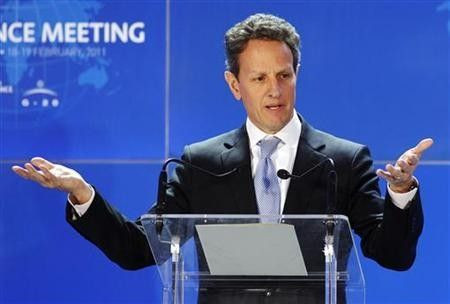Geithner points to China yuan spillover to others

Treasury Secretary Timothy Geithner on Saturday pointed to the problems China's tightly controlled currency poses for other developing economies and said Beijing still had further to go to let its currency rise.
Talks at a Group of 20 meeting in Paris centered round efforts, led by Germany and G20 presidents France, to persuade China to include its yawning current account surplus and undervalued currency in a list of measures aimed to start a process of rebalancing the global economy.
There was little public evidence that the United States itself had pushed Beijing hard on that issue, but Geithner reiterated that there was still some way to go in the steady appreciation of the yuan.
China's currency remains substantially undervalued, and its real effective exchange rate -- the best measure to judge its currency against all of its trading partners -- has not moved much in this latest period of exchange-rate reform, Geithner told a press conference after the meeting.
China stuck to its guns, saying currency reform was a matter for internal discussion; the final G20 communique made no mention of foreign currency reserves and included softened references to exchange rates and the current account.
That came after frank, sometimes tense negotiations over a set of indicators for gauging economic imbalances and suggested more progress will not be easy on an issue western governments hope will allow them to put more pressure on Beijing.
Geithner cast the issue as part of a broader problem faced by countries like Brazil, which has a flexible exchange rate but must deal with large capital inflows that push its currency up and create inflationary pressures.
Normally the response to such inflation would be to hike interest rates but that might draw even more capital and Brazilian officials at the meeting said the problem was about both China and other Asian economies.
All Asian countries need to stop devaluating their currencies, it is a set of responsibilities, it is not just China, Brazilian Finance Minister Guido Mantega said on Friday.
COMPROMISE
Geithner offered reassuring words about the U.S. economy, saying that growth was gathering momentum and said European leaders had told G20 peers that they would ensure that struggling euro zone nations and their banks would have access to financing.
China is now the world's second largest economy, but still a fast-growing emerging market and Geithner said stronger standards for appropriate foreign exchange policies would help accommodate the changes in economic forces ahead.
The G20 gathering, chaired by French Finance Minister Christine Lagarde, did agree on a list of indicators that could be used to gauge economic imbalances but it was a compromise that fudged the reference to currency values.
The final list included public debts and fiscal deficits, private savings and private debt, the trade balance and other components of the balance of payments such as net investment flows. It said only that exchange rates would be given due consideration.
Geithner said the G20 was moving gradually toward a pact on how to identify and resolve imbalances, driven by a wish to avoid a repeat of the global financial crisis that struck in 2008, but said it will take time to do so.
In response to questions, he played down the significance of not including excess reserves as one measure of imbalances, given that China has the world's largest reserves of foreign
currency.
The question of reserves is not really critical at this stage, Geithner said. You have to take into account broader sensitivities and how to deal with the challenges of excess reserves and it may take a little bit more time to work through.
© Copyright Thomson Reuters 2024. All rights reserved.





















